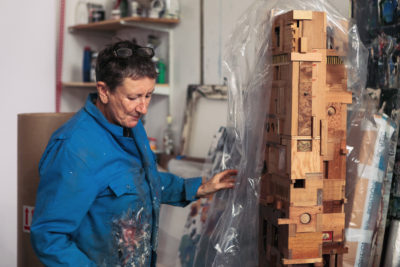We all fail. What really matters is what we do next.
In 2007, indie film auteurs Quentin Tarantino and Robert Rodriguez released Grindhouse.
Their homage to trashy cinema double bills, it had a film directed by each of them, and spoof trailers made by other directors in between. It was also an unexpected flop, the first time either of them had released a film that didn’t do well at the box office.
I met up with Tarantino in Berlin a few months later, at the German premiere of Death Proof — a film fashioned out of his half of Grindhouse, reworked with 25 minutes of extra footage and released as a stand-alone film in its own right.
There aren’t many A-listers from the film world who are comfortable with the ‘f’ word. By which I mean not the swear word that peppers Tarantino’s conversation, but a far more taboo one: failure. Which, in Hollywood, means losing money.
As Harvey Weinstein proved, you can get away with an awful lot for a long time in the film industry — providing you’re making a profit on your pictures. But losing money? That’s something few like to talk about.
Tarantino, however, was not offended when I asked him how it felt, to have his first commercial flop. Instead he laughed, and seemed to enjoy dissecting what went wrong with Grindhouse, and his part in that.
So here’s what all creatives can learn from his experience.
1. Savour the moment your creation makes its debut.
First, Tarantino told me about his routine on a film’s opening weekend. Most directors like to get the numbers as the weekend progresses, with figures coming in first from the east coast of the US as the cinemas there close for the night, then gradually rolling through the time zones until the box office totals come in for the west coast several hours later.
Tarantino told me he’d always preferred to wait until Monday morning, and find out his opening figures by opening the Hollywood newsheet Variety. Over the weekend, it was his custom to visit a variety of cinemas from the outer suburbs of Los Angeles to the city centre, watching how different crowds responded to his film.
“I don’t want to know how it’s doing, I don’t want the phone calls during the weekend,” he explained. “I just want to watch the movie. I’m enjoying the movie, and it’s all about the movie.”
So the weekend Grindhouse opened, that’s what he did. And the audiences seemed to be responding well. In fact, Tarantino kept leaving joyful messages for Robert Rodriguez at his home in Texas, telling him how well their double bill was playing: “It’s going so great, they’re loving it!’
2. Choose your collaborators well.
Rodriguez, meanwhile, had monitored the figures, and knew it wasn’t going anywhere as well as Tarantino thought. In fact, the takings were so bad that Grindhouse was already dead in the water: a first box office failure, for both of them.
But he deliberately avoided talking to his friend that weekend.
“I actually thought about telling you, but I couldn’t,” he told Tarantino later. “I thought, ‘I don’t want to tell him, I want to be him! I wish I didn’t have this knowledge. And I’m not going to ruin his weekend.’”
This is friendship.
3. Failure hurts. So grieve a little.
When he did find out just how badly Grindhouse had done, Tarantino was despondent.
“It was a complete shocker. The one consolation, I guess, was the fact that it was a shocker for the entire industry. Everybody thought we were going to do better than that.
“I’ve never had a failure before. Even Jackie Brown, that was a $12m movie, and we did maybe $47m. That’s fine. It’s great, actually, especially for a Pam Grier movie.
“Career-wise, for the first time in my life, I was depressed. It was like I had a broken heart. It was like somebody broke up with me. And somebody did! The American public.”
He laughs, then grows serious again.
“There was something so sad about it. Because it did so badly on the opening weekend, the film was in the theatres for three or four more weeks, but it just seemed neglected and like nobody cared. It even made me feel sad to see the ad, to see the name on a marquee. Because I knew it was lonely and disregarded.”
4. Take responsibility, and learn from your mistakes.
“Grindhouse was too expensive. That’s the bottom line. If we’d made it for $20m, we would have been disappointed by how we did. But ultimately, no problem. It was too expensive, and part of that is my fault.
“I got too precious on the movie, I got too into the characters. We had the script, then I’d get inspired during the rehearsal process and write new scenes. And that kept happening. I’d meet somebody in a bar or something, they’d tell a joke or an interesting story, and I kept adding more and more to it. I should have known better.
“It’s nice to be inspired and everything, and to not short-change your characters. But I wrote these new scenes and I actually didn’t want to put them in the script for the readings, because I knew it wouldn’t flow as well. So what does that tell you?”
5. Learn from those who’ve failed before you.
Because any one who is good at what they do, who is trying to make interesting work or push at the boundaries, is going to fail sometimes. It’s part of the process.
“I’ve got to say, for any director who’s lucky enough to be in my kind of situation, I think this might end up happening, eventually. This film was an indulgence, but it was still a very low version of indulgence.
“I watched this Spielberg on Spielberg thing, where he talked about [his expensive flop] 1941 — a film I’ve always liked — and about how he was too indulgent on it. He didn’t stop shooting sequences until he felt he got everything he absolutely needed, as opposed to making it work.
“He said, ‘You know, I learned a lesson, after that.’
“And — so did I.”
6. Seek advice from people who’ve been there.
“I called a couple of people, on that day, to talk to them about it. Steven Spielberg, and Tony Scott. They both basically said, ‘Look, Quentin. This is a game, in Hollywood. And it’s a long, long game. You’ve been shielded from part of it. You’ve been really lucky. But you haven’t officially been in the game until you’ve had this happen to you.
“Now you can say you are a well-rounded human being. You’ve had success, you’ve had failure — and you keep on going on. This failure will make your next success all the more sweeter.
‘But now you can officially say I am in Hollywood, I’ve done the thing.’”
7. Stay true to your art.
“It’s tempting — for a nanosecond, as a jerk reflex — to now think about doing something that’s a little more commercial, that’s more of a thing for an opening weekend. But doom lies down that road.
“I watched that happen to Brian de Palma for the last 15 years of his career, chasing his tail after disappointments. He had a failure, tried to recreate a couple of successes. There was a desperation about it, as opposed to — you’re a terrific artist, man, so just do your thing. And whatever happens, is what happens.”
8. And resist compromise.
“I just got offered the remake of Westworld. And I did think, ‘Well that could actually probably do alright, on an opening weekend.’ It’s the first script that I’ve read in a few years, because I was told it was pretty good, and I like Westworld.
“The problem with me reading scripts is, it takes me a long time because I start making the movie in my mind, even before I turn the page. I actually had fun trying to cast it, just on a piece of paper. ‘This guy, this guy, and this guy. No! It’s got to be this guy, or I wouldn’t do it.’ So that’s all kind of fun.”
9. Know and trust yourself.
“…But though I can think about it for a second, can I spend every day for the next year doing a film written by someone else? No way. And I know that about myself.
“I’m saved from that temptation, because I just know this about me: I need to start with the blank page.”
10. Then begin again.
By the time we met, he was already filling that blank page, working on the script for a war film he’d talked about a lot over the years, but never managed to make work.
It was early days, and he was reluctant to go into detail at the time, except to say it was going well, and he was planning to stay on in Berlin because he was finding the city inspiring.
The film was Inglorious Basterds. It came out in 2009, written and directed by Tarantino. It was unmistakably his, with no compromise in style at all.
It had a very strong opening weekend.
This interview was for the Telegraph magazine. You can read the original feature here.






What do you think?